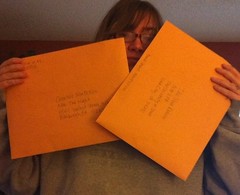Let's try something different today. Open a new tab or window. In the new tab, go to Daytrotter, the
latest Iron & Wine session. Start playing the first song,
Tree by the River. Then come back here and read this. They don't directly relate, it's just to replicate the soundtrack of my morning.
Is the music playing?
***
She drove to work like she always did: with a sick sense of dread. She scowled, and kept swallowing down the daily disappointment that threatened to hiccup out while she maneuvered through, past and around what felt like the entire city's worth of egotists and malignant narcissists on the freeway. They cut in front of her without signaling; they raced up on her back bumper; they tried to cut around her on the right--to beat the end of the turn lane and the two cars behind her.
Some days she could ignore the traffic: soft music from her sweet and melancholy mix could be a balm. Most days it felt like the prologue to a day full of fighting off whining, demanding, inconsiderate humanity as it cut itself off in the checkout line, stole sticks of gum, and begged for free samples. This is what the drive to a job in retail does: it beats you down, so you have no illusions when you walk through the automatic doors.
By the time her freeway exit is in sight, anxiety and numbness are fighting over her nervous system. She is trying to let it go, think positive. She still has her eye on the car clock, though. As usual, it took every ounce of will she has to get out of bed--to make her limbs jangle through the motions of getting ready for work. She's cut it close, again. Every day: late.
All the way to the slowing arc of road that peels her off the greater flow of cars and carnage, she tells herself over and over,
It could be worse. And in a million ways it could. She could have no job, no legs, no eyelids. She could be mopping up cum at a porno theater for minimum wage. She could be tarring roofs or roads.
It could be worse is her mantra to get through the leaden days of obsequious tedium wherein
the customer is always right.
She has one more merge to make after her exit. The light is less than 400 yards to her right, with three lanes to cross so she can turn left. It's a divided road, so she glances quickly out the right side where all of the traffic has just gone and then focuses on the left, the direction it's coming from. It's rush hour, so she has to be ready to leap across once she has a window.
This is the part of the drive where she has to wake up for a moment: sometimes this lunge across the lanes has to be cut close enough to make her heart pound and neck hair tingle. Today she sees a car coming, but gauges it to be in the far left lane. She jumps into the turn and as her line of vision shifts from the side window, back to the windshield, she sees a bicycle coming straight at her.
He looks young. Maybe 19, with shaggy dirty blond hair blowing behind him. He's skinny, wearing black fingerless gloves and a windbreaker. She can't tell if his expression changes when they look at each other in the eye across the telescoping gap between their respective metal, rubber, and bones.
There is no time to think about what he's doing on the wrong side of the road. She doesn't even think about all those riders who have died in the last town she called home from this exact maneuver--trying to cut across the flow to save time at a light further up--or the drivers charged with manslaughter when they do. She has a split second to decide to yank the wheel to the left or the right. She remembers that car coming behind her, and pulls hard to the right, over curb, gravel, bits of metal and wood. Rolling, crunching over the sort of empty lot that exists out past sidewalks, lined with zoning signs, price tags, windblown trash.
The kid on the bike doesn't even slow down. He's close enough to her door to clothesline and still, he just barrels away behind her. He's probably cut it close today, too. She rumbles over the curb back into the bike lane (the arrows still pointing forward, stabbing into his bike tires as he continues in the wrong lane), and then waits a moment before leaping across the three car lanes to make her turn. Only after the left, with the arrows and gravel and knuckles poking out of fingerless gloves well behind, does her breath grow ragged, like a fish on a line, gawping for water. But she doesn't cry until she gets to the parking lot at work. And even then, she's only got two minutes to do it.


